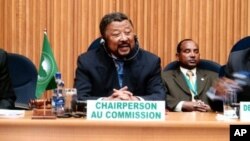African Union Commission Chairman Jean Ping has offered a defense of AU policy on Libya during an opening address to the continental summit underway in Addis Ababa. Ping is favored to win re-election as chairman, despite a strong challenge from South Africa.
Speaking to Africa's foreign ministers Thursday, Chairman Ping said the AU's difficulty with handling the Libyan revolt was that it did not start with peaceful demonstrations, as with other “Arab Spring” uprisings.
The African Union came in for withering criticism during Moammar Gadhafi's last months in power for a mediation attempt that could have kept the Libyan dictator in power. Defending the policy, Ping said AU thinking had been based on concern that Libya might become a failed state like Somalia if Gadhafi were overthrown.
AU policymakers at the time expressed concern at reports the Libyan rebels were allied with al-Qaida. In the end, an AU mediation team was sidelined as NATO airstrikes ensured the inevitability of Gadhafi's fall.
Ping argued that Africa's voice has become more influential during his four years at the helm.
"At the international level, the commission observes with satisfaction that the voice of the African Union is heard increasingly on the international stage and in the community of nations," he said. "I want to recall that we will have the opportunity to have our voice heard at the G8 and G20, and the commission is being consulted by the U.N. system in all that affects and concerns the continent."
In a sign of dissatisfaction with Ping's leadership, South Africa has offered its home minister and former foreign minister Nkosazana Dlamini-Zuma as an alternative candidate for the commission chairman's post. Dlamini-Zuma is a veteran of the anti-apartheid struggle who has served in the cabinet of every president since Nelson Mandela.
But AU observers say the South African challenge is running into stiff opposition. Analyst Mehari Maru of the Institute for Policy Studies in Addis Ababa says Ping, a former Gabonese foreign minister, has the backing of small countries that object to one of Africa's most powerful nations leading the commission.
"Traditionally this position was held by a candidate from smaller countries," said Maru. "It's not a written rule, but the practice is big countries like South Africa and Nigeria do not run for this position. So this is the kind of kind of tacit or ghost agreement if you wish, and a change now by South Africa without consultations with the major powers, regional leading countries, is received with some surprise."
AU observers caution, however, that the selection of a commission chairman is by secret vote of African heads of state, and anything can happen in that group.
AU Peace and Security Commissioner Ramtane Lamamra is also facing opposition in his bid for re-election. Ethiopia, the summit host country, has offered its AU Ambassador Konjit Sinegiorgis as a candidate for the post. Lamamra is expected to win re-election, but he tells VOA the contest is a healthy sign of the continental body's democratic structure.
"This is democracy at work, so it's good to be questioned and it's good to see whether it's worthwhile continuing or not," said Lamamra.
The AU heads of states will also choose one of their own to the rotating position of African Union chairman. By convention, the one-year post rotates by region, and this year is West Africa's turn. Observers say the two finalists for the job are Benin and Nigeria.
Heads of state arrive for a two-day meeting starting Sunday. Elections are expected to be among the first items on the agenda.
Ping Defends AU Libya Policy in Summit Opening Speech




